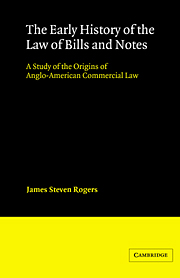 The Early History of the Law of Bills and Notes
The Early History of the Law of Bills and Notes Book contents
- Frontmatter
- Contents
- Preface
- Table of cases and precedents
- Note on citation
- Introduction
- 1 The central courts, commercial law, and the law merchant
- 2 Early exchange transactions: commercial practice
- 3 Early exchange transactions: private law
- 4 Early exchange transactions: public law and policy
- 5 From exchange transactions to bills of exchange: the transformation of commercial practice
- 6 The custom of merchants and the development of the law of bills
- 7 The civilians and the law of bills in the seventeenth century
- 8 Transferability and negotiability
- 9 The law of bills and notes in the eighteenth century
- 10 The problem of accommodation bills
- Conclusion
- Bibliography
- Index
1 - The central courts, commercial law, and the law merchant
Published online by Cambridge University Press: 22 September 2009
- Frontmatter
- Contents
- Preface
- Table of cases and precedents
- Note on citation
- Introduction
- 1 The central courts, commercial law, and the law merchant
- 2 Early exchange transactions: commercial practice
- 3 Early exchange transactions: private law
- 4 Early exchange transactions: public law and policy
- 5 From exchange transactions to bills of exchange: the transformation of commercial practice
- 6 The custom of merchants and the development of the law of bills
- 7 The civilians and the law of bills in the seventeenth century
- 8 Transferability and negotiability
- 9 The law of bills and notes in the eighteenth century
- 10 The problem of accommodation bills
- Conclusion
- Bibliography
- Index
Summary
Before examining the early history of the law of bills of exchange, one must clear up a common misconception about early English commercial law in general. The starting point of most treatments of the early history of English mercantile law is the assumption that there were essentially no cases concerning commercial matters in the common law courts before the seventeenth or eighteenth centuries. Thomas Scrutton began his influential work on the history of mercantile law by noting that ‘if you read the law reports of the seventeenth century you will be struck with one very remarkable fact; either Englishmen of that day did not engage in commerce, or they appear not to have been litigious people in commercial matters, each of which alternatives appears improbable’. In the same vein, a mid-twentieth-century American treatise on the law of bills and notes notes that ‘from the 1000's to the 1600's scarcely a case, dealing with commercial paper, was reported in the common law courts of England, though these instruments were in use in England, as well as in Europe, as early as 1300’. A careful examination of the early English sources, however, belies this assumption. As J. H. Baker has shown, the common law courts regularly dealt with commercial matters from the earliest times.
- Type
- Chapter
- Information
- The Early History of the Law of Bills and NotesA Study of the Origins of Anglo-American Commercial Law, pp. 12 - 31Publisher: Cambridge University PressPrint publication year: 1995


